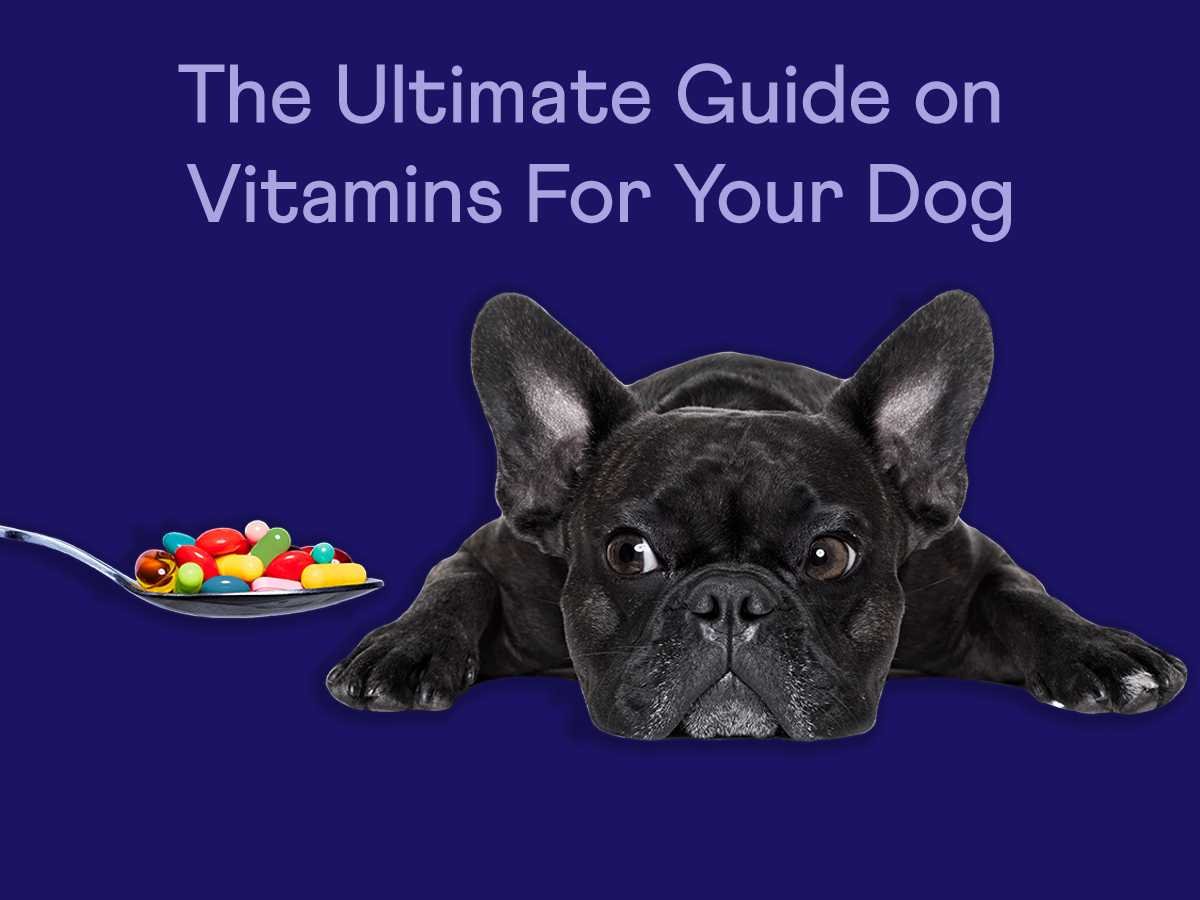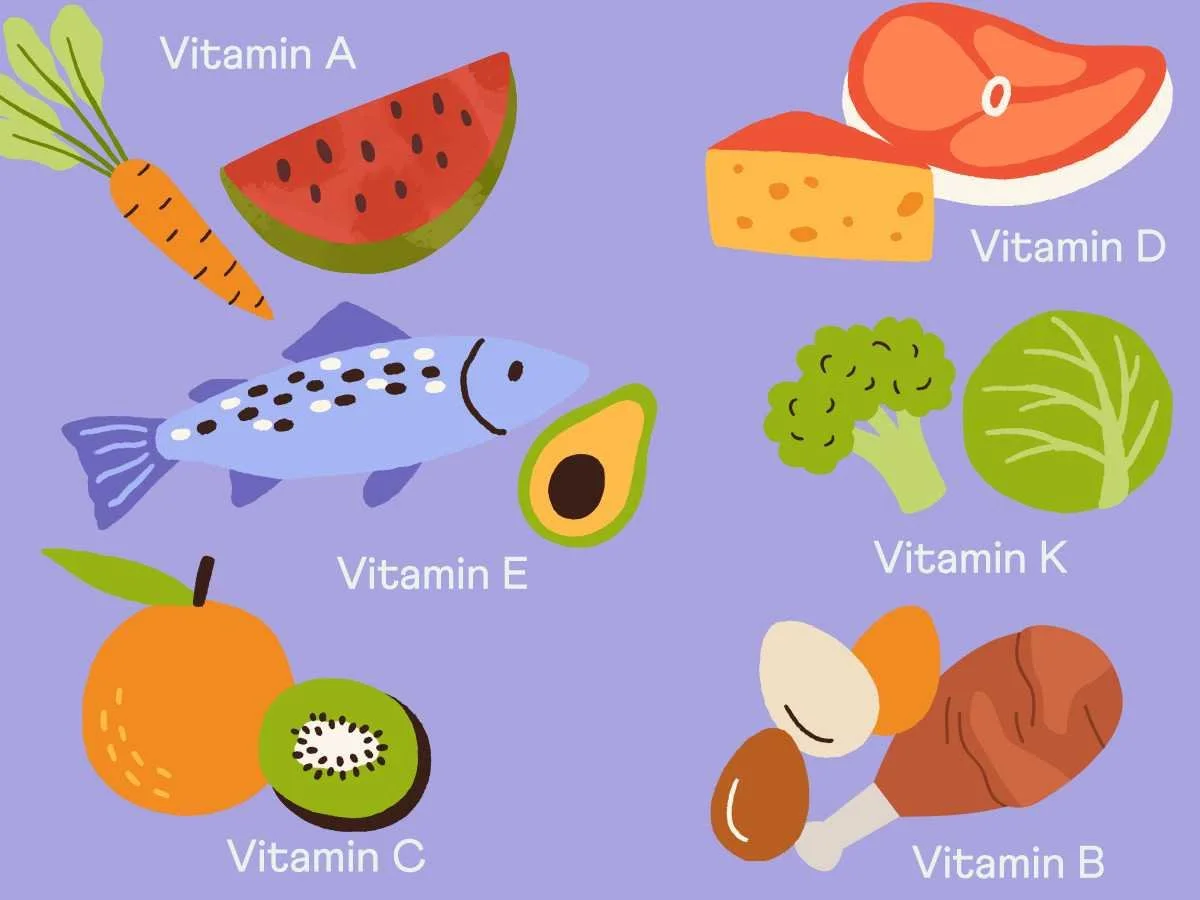Dog Vitamins: The Ultimate Guide On Vitamins For Your Dog
Like humans, dogs need vitamins for optimal health and nutrition. Read on to learn the ins and outs of dog vitamins, their importance, and how to properly supplement for vitamins your dog might be lacking.
Table of Contents:
Vitamins and nutritional supplements are a great way to support your dog’s long-term health.
The first step is determining if your dog needs vitamins all; and if so, what type of vitamin or supplement your dog would benefit from most
What Are Vitamins?
All living beings, humans and dogs alike, need vitamins, nutrients, minerals, and other supplements to survive. These organic compounds play integral roles in a variety of bodily functions – including metabolism, digestive health, immune system and allergy response, joint and connective tissue health, and dermatologic (skin) health.
While we strive to get all the vitamins we need through a healthy, diverse diet, vitamins that our bodies lack can be found in supplements that are taken to support overall well-being.
Types of Vitamins
There are two types of vitamins to be familiar with: water-soluble and fat-soluble. It’s important to note the differences as a dog can easily overdose on fat-soluble vitamins.
Water Soluble
Water-soluble vitamins can not be stored in fat cells, and it doesn’t require fat to be absorbed by the body. They are excreted from the body through urine, so there is no significant risk of overdosing with fat-soluble vitamins and heavy metals.
Examples of water-soluble vitamins include vitamin B complex and vitamin C.
Vitamin B Complex: The vitamin B family works to support a variety of bodily processes and functions.
B complex vitamins include:
Thiamine - to regulate energy and carbohydrate metabolism
Riboflavin - for enzyme function
B6 - for glucose generation, red blood cell and nervous system function, hormone regulation, immune response, gene activation, and niacin synthesis.
Pantothenic acid - to help with energy metabolism
Folic acid - assists amino acid and nucleotide metabolism and in mitochondrial protein synthesis.
Vitamin C: Vitamin C acts as an antioxidant. The liver typically synthesizes this vitamin on its own. This vitamin removes free radicals from the body, reduces discomfort, and supports cognitive aging.
Fat Soluble
Fat-soluble vitamins, unlike water-soluble vitamins, require fat or lipids to be absorbed by the body. They travel through the lymphatic system of the small intestines in fat globules, or chylomicrons, before entering the bloodstream and being stored in the body tissues.
Deficiencies occur when the body does not take in enough fat or an underlying condition affects fat absorption.
Fat-soluble vitamins include:
Vitamin A
Vitamin D
Vitamin E
Vitamin K
Vitamin A: Vitamin A (beta-carotene) is great for your dog’s skin and eyes and helps support weight loss. Carrots provide a great source of Vitamin A and are generally very safe for dogs to consume. If your dog is prone to sickness, has dry skin, or needs a little extra vision support, they may need more vitamin A in their diet.
Vitamin D: Keep those muscles, bones, and teeth strong and healthy with Vitamin D. Also referred to as the “sunshine vitamin,” Vitamin D balances minerals to help with bone growth. If your dog suffers from swollen joints or bowed legs, it may have a vitamin D deficiency. Vitamin D absorbs calcium, promotes healthy bones, muscle movement, and immune system function. However, excessive amounts are lethal. Symptoms of vitamin D poisoning show after 12-36 hours of ingesting and include vomiting, diarrhea, depression, suppressed appetite, and abdominal discomfort.
Vitamin E: Similar to Vitamin A, Vitamin E is essential for the eyes and skin. It also is essential to cell function and fat metabolism. Becoming deficient in Vitamin E could result in eye and muscle degeneration or reproductive problems.
Vitamin K: Vitamin K is responsible for supporting your dog’s ability to clot blood. Ensure that your dog is getting enough vitamin K in their diet, even if you need to add spinach and kale to their mealtime.
Does My Dog Need Vitamins?
Vitamins are built into your dog’s diet through the food they eat. They keep your dog’s bodily functions running smoothly and improve their daily health and lifestyle.
So how do you know if your dog has a deficiency?
Commercial diets list out the nutrition facts, so you should know what and how much your dog intakes daily.
The question to ask is: “Is that enough?”
Is your dog taking enough of the necessary vitamins and minerals needed for growth? It may not be, especially for dogs on a homemade diet. Of course, a good home-cooked meal is savory and delicious, but a recipe rarely includes every vitamin and mineral your dog’s diet requires.
A dog’s needs change throughout its life. All dog breeds and lifestyles have different nutritional requirements. For example, a puppy’s nutritional requirements differ from a senior dog’s, and hunting dogs differ from a show dog’s.
A general rule of thumb is that dogs without health problems and those who eat a balanced diet may not have an immediate need for vitamins.
You may know your dog best, but you should still consult your vet before introducing vitamins and supplements to your dog's diet. Your vet can help you identify deficiencies, if any, and recommend top-notch products to include in your dog’s diet.
Vitamins vs. Supplements — Are They Different?
The answer is yes; vitamins and supplements are different.
Vitamins focus on a specific type of vitamin, whereas dietary supplements contain a medicinal compound or a combination of vitamins, minerals, and more to promote health. A common supplement that is safe for dogs is a dog multivitamin. Multivitamins are known to contribute to a dog’s healthy, sustainable life by providing vitamins, nutrients, minerals, and other nutrient-dense ingredients to your dog’s diet.
While looking at a supplements label, you may find traces of:
Amino Acids - arginine, histidine, isoleucine, leucine, lysine, methionine, valine, tryptophan, threonine, and phenylalanine
Glucosamine
Chondroitin
Enzymes - lipase, amylase, protease, papain, bromelain, cellulase
Minerals
Probiotics - lactobacillus acidophilus, enterococcus faecium, bifidobacterium lactis, lactobacillus casei, and bifidobacterium breve
Omega-3 fatty acids - salmon, mackerel, sardines, fish oil, flaxseed oil, flaxseeds, walnuts, and chia seeds
Omega-6 fatty acids - safflower oil, sunflower oil, corn oil, soybean oil, sunflower seeds, walnuts, pumpkin seeds
Coenzyme Q10
Herbs and botanicals - milk thistle, chamomile, ginger, valerian root, cranberries, CBD, and more
The mixture of these compounds added to your dog’s wellness routine can be beneficial. For example, specially formulated supplements help with joint and hip health.
Antioxidants
Antioxidants improve your dog’s quality of life. Ever heard of oxidation? This is a naturally occurring chemical process the body performs to break down food consumed into nutrients for dogs. As a by-product, it creates free radicals, which assist the body in keeping viruses away.
In a large quantity, free radicals can harm the body, damaging cells. This is where antioxidants come into play. Antioxidants, such as ascorbic acid (Vitamin C), help restore balance in the body.
Dietary Fiber
High fiber equals a stronger digestive tract. It can either be soluble or insoluble, both having their own individual benefits.
Soluble Fiber: Soluble fiber is digested, and some are considered prebiotics. This means that there is a chance of building more good bacteria in the digestive tract. It helps with symptoms caused by large bowel diarrhea, such as needing to go but only producing a small amount of stool, straining, and finding mucus or blood in the stool.
Examples of soluble fiber include:
Chicory
Inulin
Fructooligosaccharides
Pectins
Psyllium
Plant gums
Oats
Barley
Beet pulp
Insoluble Fiber: Insoluble fiber is not digested; but instead, it is passed through the gut. This type of fiber keeps dogs feeling fuller longer, ultimately helping with weight loss, regulating body weight, and constipation.
Examples of insoluble fiber include cellulose, hemicelluloses, and lignins.
Vitamins and Supplements Can Help With Common Concerns
Vitamins and supplements can help support your dogs’ overall health. Before giving your dog any type of supplement, check with your vet to ensure no underlying medical conditions need to be diagnosed and treated first.
Joint Issues
Large and giant breeds suffer most from joint issues. Dog’s may or may not show signs of discomfort, making it hard to diagnose. =
Joint supplements are one of the most commonly purchased supplements. They include glucosamine or chondroitin, which can help support joint health proactively.
Urinary Issues
Not to sound like a broken record, but glucosamine comes to the rescue for urinary tract issues too! Dogs that have recurring urinary tract infections, for example, can benefit from a supplement with glucosamine or with cranberries.
Other urinary tract issues that can benefit from vitamins include bladder stones, incontinence, and crystal stones. Some urinary tract infections have underlying causes, such as metabolic issues, so be sure to treat the primary infection first.
Skin and Coat
The best way to enhance your best friend's coat and stop the urge to scratch from an itch is with omega-3 fatty acids. These derive from sources of healthy fats like fish oil or flaxseed oil, and can help reduce discomfort and support immune health.
Stress and Restlessness
Have a pup that gets stressed easily when their environment gets a little loud or stimulating? Stress can be triggered when dogs are bored, frustrated, anxious, or even scared. A slight change of routine can give your dog added stress.
Stress releases cortisol, which can lead to discomfort. Consider giving them a chill pill supplement that can help them feel more relaxed. Ingredients to look for include CBD, chamomile, melatonin, valerian root, l-theanine, and l-tryptophan.
Digestive Issues
No one wants tummy troubles. Diarrhea and upset stomachs are painful, and we are sure it’s not exciting to clean up after either.
Digestive issues can stem from several issues such as stress, allergies, an oversensitive immune system, and more. A healthy balance of gut flora is a must to repair digestive issues.
Probiotics are the winners here. Probiotics are basically good bacteria, aiding in digestion and the regulation of the immune system.
You may also consider increasing the amount of fiber in the diet.
Are There Risks Associated With Taking Supplements?
Vitamins and supplements do not have the same oversight as other drugs approved by the Food and Drug Administration.
Supplements can be sold on the market if the FDA has not proven them to be unsafe. Before purchasing and introducing a product to your dog, you need to be careful.
Your dog’s age, activity level, medical condition, diet, and other factors go into effect when determining if they require a vitamin or supplement.
It is best to follow recommendations from your veterinarian. They can refer you to a trusted brand, type of vitamin or supplement to use, and the dosage to follow to keep your dog happy and healthy.
Which Vitamins Are Toxic to Dogs?
It’s important to note that human vitamins are not the same as those specially formulated for dogs, and may contain ingredients that are toxic to your pup. It’s important to use a supplement that was specifically formulated by veterinarians, and is specifically for dogs.
For example, xylitol is a sugar-alternative gum sweetener that’s included in many human vitamins. Ingesting xylitol can quickly make your dog lethargic and cause all sorts of digestive issues, amongst other unwanted behaviors.
Definitely don’t EVER give your dog any supplement that includes the ingredients below, which can be toxic to your pup:
Caffeine (guarana or green tea)
Fluoride
Yohimbine
Ephedra
Citrus aurantium
Five hydroxytryptophan (5-HTP)
Choosing the Right Supplement
First things first, what does your vet recommend? We ask this question because not all dogs need to take a vitamin, enzyme, or supplement. Most are used for dogs that are not on a balanced diet or are showing deficiencies.
If you are out shopping for vitamins, here are a few tips:
Verify the supplement has NASC Approval. The National Animal Supplement Council is a nonprofit organization. They review products for quality and safety and provide their seal of approval on products that pass the test.
Don’t overdo it. Give your dog the added nutrients they need, nothing more.
Check your notes from the vet’s office. If they recommend a product or a specific vitamin, follow their direction. Don’t just purchase from a retailer because they are well-known. Make sure the product is veterinarian-approved!
Watch for signs of vomiting, diarrhea, lethargy, and skin peeling after giving your dog vitamins or supplements. These symptoms may be related to vitamin toxicity and require immediate attention from your veterinarian.
Natural Ways To Increase Vitamins and Nutrients in Your Dog’s Diet
If you aren’t a fan of giving your dog vitamins and minerals they may need in the form of a pill, powder, or treat — fear not. There are safe and delicious fruits and vegetables at your disposal.
Below are a few options that you can share along with your dog, but remember to feed them in moderation to avoid an upset stomach:
Carrots - Vitamin A
Apples - Vitamin A and C
Blueberries - Vitamin C and antioxidants
Sweet Potatoes - Vitamins A, B6, and C. Remember to serve sweet potatoes baked or boiled (sans seasoning!). Never serve them raw!
Bananas - Magnesium and Potassium
Watermelon - Vitamin A and B6. Remove the seeds and the rinds to prevent choking.
Cucumbers - Vitamin K
Green Beans - Calcium, Iron, and Vitamin K
The Bottom Line
Dog’s need vitamins to maintain a healthy lifestyle and promote growth.
Vitamins are typically generated either by the body or consumed in dogs’ food. Sometimes when a deficiency occurs, supplements can be beneficial to add to your dog’s diet. Stick to trusted, natural, quality vitamins and supplements that veterinarians recommend.
Finn offers trusted nutrition for your best friend. Supplement products offered by Finn include natural ingredients that your dog will love, excluding artificial additives and unnecessary fillers.
Visit Finn today and explore several clinically proven supplement options that are endorsed by veterinarians and are simply worth barking about.
Sources:
Common Vitamins and Pet Toxicities | ASPCA
Nutrients Your Dog Needs and How to Tell if They’re Getting Them | One Green Planet








